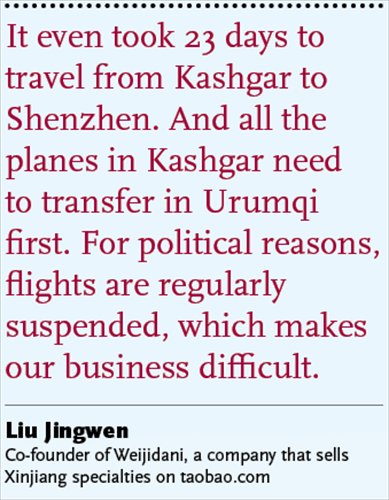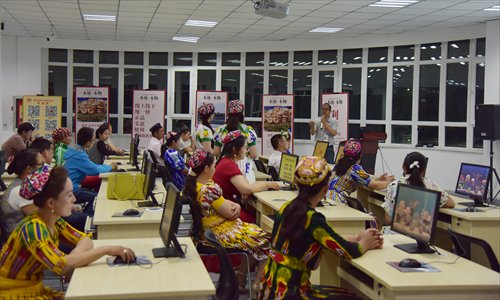Xinjiang e-businesses face logistics, language and training hurdles
The Xinjiang government is using e-commerce to boost the local economy and solve the region's employment issues. In the past two years, local e-businesses have rapidly developed and many Xinjiang residents are joining the trend. But due to language barriers, poor logistics and a lack of trained Uyghur talents, there are still major hurdles to overcome.

A boy harvests melons in Turpan, the Xinjiang Uyghur Autonomous Region. Photo: CFP
Apples are picked from trees after the third frost in Yuli county to guarantee they are sweet and crisp, then they are delicately packed and transported to other parts of China.
Although it is a less-explored place on the map, Yuli, Northwest China's Xinjiang Uyghur Autonomous Region has now seen a tidal wave of online orders flooding in from across the country for its produce.
As of 2015, the national government has set aside 130 million yuan ($20.9 million) to boost e-commerce development in Xinjiang, which can be used to built e-commerce service centers, develop logistics systems and train locals in the basics of online trade, the Xinhua News Agency reported. Yuli county, as a "demonstration e-business county," enjoys extra government support.
"Xinjiang has so many good products which due to its remote geographic position are not known widely. But now e-commerce provides an opportunity to introduce Xinjiang's products to the rest of the country. This will help boost the local economy as well as solve employment problems," said Huang Changhui, director of the Yuli county e-business association.
A Xinjiang University and Alibaba, China's leading e-business, joint research report on e-commerce development in Xinjiang in 2015 showed that currently there are more than 40,000 active e-businesspeople in the region. In the first 10 months of 2015, the number of active businesspeople has seen a more than 60 percent increase compared with last year. In the first half of 2015, the trade volume for Xinjiang's e-businesses on the taobao.com online commerce platform exceeded 8 million transactions.
But still, the development of e-commerce in the area is concentrated in Urumqi, the regional capital. At the county level, people still know little about how to make money from the Internet and need guidance, according to Huang.
Due to the region's poor logistics and lack of e-commerce talents, Xinjiang's road to boosting its economy through e-businesses will be challenging and bumpy.

E-business expansion
Huang registered his e-business Bendibenwu in 2014. Leading a team of some 50 people that consists of both ethnic Han and Uyghurs, Huang handpicks local produce, such as red dates and walnuts, and sells them on the company's website and via mobile clients.
"The feedback from our customers is quite positive. They trust our food safety" he said.
Huang was given the title of "honorable villager" by the head of Yuli's Daxi village in 2014, becoming the first Han to receive this honor in Xinjiang. The local head hopes Huang can use his talent to help develop other villagers' e-businesses.
According to Huang, he has set up a training program which provides lessons in online sales in both the Uyghur language and Putonghua to locals, the first bilingual e-commerce training program in Xinjiang.
So far, more than 4,000 people have participated in his classes.
"An important group of students are middle-aged housewives. We teach them e-commerce basics, so they can see opportunities in it and call their children back to hometown to devote themselves to this business," he said.
Besides, he has tried to set up stations at each village in the county, which collect locals' products and help villagers with their e-businesses.
"At the beginning, there were not many Uyghurs supporting me and some of them saw me as an intruding enemy. But now things become better. We've covered 90 percent of all villages in Yuli," he said. "I employ good Uyghur staff members who are helpful in communicating."
Director of the Xinjiang Statistic Bureau Xu Bin said in a news conference that in 2015, the turnover of retail sales for e-businesses in Xinjiang reached 4.44 billion yuan, a 20.3 percent increase compared with the previous year.
The most popular Xinjiang product is dried snacks. Red dates, raisins and walnuts are the products most sought-after by customers in other parts of the country. In 2014 and 2015, Xinjiang's jade has become increasingly popular too, said the Alibaba report.
Dilmurat, a Urumqi-based e-businessmen that sells nang (a kind of crusty flatbread widely eaten in Xinjiang) on taobao.com, told the Global Times that when they first opened their shop in 2012, there were just a few orders each day. But now, they receive more than 3,000 orders each day on average and have over 1 million yuan in annual sales.
"Our main customers are Xinjiang people living in other parts of the country. Because of the differing customs, they aren't used to the food there. So they buy our products," Dilmurat said.

Students attend e-commerce workshop in Yuli county in 2015. Photo: Courtesy of Huang Changhui
Language barrier, poor logistics
On November 24, 2014, Jack Ma Yun, executive chairman of Alibaba, made a speech at Xinjiang's e-commerce development forum. He said that the e-commerce sector in Xinjiang has just started and predicted the next three years will be the toughest time for its development.
While the number of netizens is on the rise in Xinjiang, Huang noted that because of the language barrier, many have difficulties in buying and selling products online on Putonghua-only platforms.
At the beginning of 2015, there were 11.39 million netizens in Xinjiang, accounting for 50.3 percent of the population, according to the China News Agency.
"Many can't speak Putonghua or recognize Chinese characters. So we need to help them to translate. Sometimes, my Uyghur customer service staff have to help them purchase goods they need from other e-businesses," Huang said.
Wang Hailing, a professor at Xinjiang University, told the Xinjiang government news site Tianshan Net that there is a severe shortage of middle- and high-end talents in the logistics industry in Xinjiang.
Currently businesses in the region have to pay lots of money to hire people in other parts of the country to design logistics programs.
As Xinjiang borders Central Asia, its location poses different demands on workers. "To master a minority language is more useful than knowing major languages like English," Wang said.
"Also, inefficient logistics poses hurdles for e-business," Liu Jingwen, co-founder of Weijidani company, which sells Xinjiang specialties on taobao.com told the Global Times.
Liu's company first delivered their products from Kashgar, a major city in Xinjiang, but they quickly found out that controlling deliveries is out of their hands.
"It even took 23 days to travel from Kashgar to Shenzhen [a port city in South China's Guangdong Province]. And all the planes in Kashgar need to transfer in Urumqi first. For political reasons, flights are regularly suspended, which makes our business difficult," he said. "So now we have to deliver products from Urumqi."
According to the Alibaba report, Urumqi hosts 70.91 percent of all e-businesses in Xinjiang, followed by the Ili Kazak Autonomous Prefecture with 6.23 percent and the Bayingolin Mongolian Autonomous Prefecture with 5.97 percent.
"The overall environment is not good as the e-commerce development in the region is imbalanced and there is a lack of high-quality service firms," Chen Bing, professor at Xinjiang University who has been researching Xinjiang's e-businesses for several years, told China News Agency.
"It needs collaboration from the government, e-business companies, individual e-businessman and service providers to accelerate its development," Chen said.
Finding a way out
In 2014, Zhejiang-based e-business consultancy firm Toyourway was invited by the Aksu Prefecture and Zhejiang governments to help people in Aksu develop e-businesses.
In addition to running classes in Aksu, Toyourway also brings potential e-business talents to Hangzhou, capital of Zhejiang and home to Alibaba, for a one-month intensive training session.
In Hangzhou, participants get involved in the practical operation of e-businesses and get internships in some big e-business companies, according to Gao Jiong, vice general manager of Toyourway.
"All the fees are covered by the government," said Gao. So far, the company has trained more than 100 people.
In the beginning, only Han people applied for the training program. Gradually, Uyghur people have joined the program.
At the last training course of 2015, 40 percent of students were Uyghurs. "They even brought nang to Hangzhou so they could eat food they like during the training," she said.
So far the lectures on e-business courses only use Putonghua, but Gao said that they intend to cultivate more Uyghur lecturers this year.
"We will publish a guidebook on e-business in both languages this year in the region," she told the Global Times.
Gao is optimistic about the future of Xinjiang's e-businesses.
"When we first went to Aksu, there were just a few individual e-businesspeople, but now there are mature e-businesses springing up. And many students who listened to our class have become good e-businesspeople," she said.
In 2016, Toyourway is planning to unite all e-businesspeople in the region to talk with logistics firms to reduce costs and also to integrate them with the national market.
"We will inspire them to find more local niches, instead of just following what others sell in the market."
Huang said that he has solved the logistics problem by buying cold storage trucks and setting up warehouses in several cities out of Xinjiang.
"There is still a long way ahead to fully develop e-commerce here, but the future is bright. From the effect we see, e-businesses have brought greater incomes to locals and increased their self-confidence. To let them truly feel the benefits brought by the Internet is the best way to maintain the region's stability," he noted.
Jiang Jie contributed to this story
Newspaper headline: Selling Xinjiang